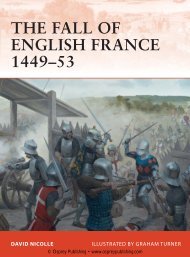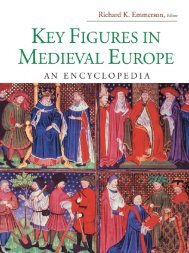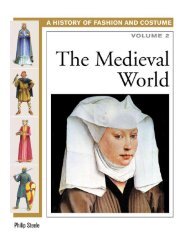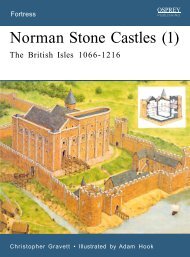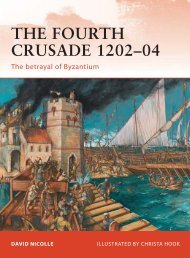Osprey - General Military - Knight - The Warrior and ... - Brego-weard
Osprey - General Military - Knight - The Warrior and ... - Brego-weard
Osprey - General Military - Knight - The Warrior and ... - Brego-weard
You also want an ePaper? Increase the reach of your titles
YUMPU automatically turns print PDFs into web optimized ePapers that Google loves.
That life began at an early age. William Marshal was 12 when he was sent to<br />
William de Tancarville's household, <strong>and</strong> he served as a squire for eight years before<br />
being knighted. Unfortunately his biographer chooses to gloss over these early years,<br />
presumably as they were unable to offer much glory in which he could bathe his<br />
subject, so we do not know whether de Tancarville taught the boy himself or, as is<br />
more likely, the task fell to one of the knights of his familia.<br />
Everyone knows that the knight began his training as a squire under another<br />
knight, learning his trade from the ground up. Effectively, the boy was an apprentice<br />
knight, retaining his social status <strong>and</strong> rank. In Chaucer's Canterbury 1'ale.t the squire<br />
ranks in second place in the hierarchy of pilgrims, right behind his father the knight.<br />
He is well dressed, with curled hair <strong>and</strong> embroidered gown; he is most definitely<br />
not a servant. It is true that squires were expected to share in some of the care of his<br />
knight's horses <strong>and</strong> armour <strong>and</strong> serve him at table, but these duties, <strong>and</strong> in particular<br />
the latter, were a distinction rather than a lowly duty. This is why Chaucer remarks<br />
that the squire 'carved before his father at the table' alongside his knowledge of poetry<br />
<strong>and</strong> dance <strong>and</strong> singing <strong>and</strong> rhetoric. All of this was part of his education, in which he<br />
was taught not only the practical care of his equipment <strong>and</strong> his horse, but also the<br />
social graces <strong>and</strong> arts as well as martial ones.<br />
Princes did not, in general, get sent to other courts. It was generally considered<br />
politically unsafe to send heirs away <strong>and</strong> so a series of men were employed to school the<br />
princes within their own households: nutritii, a sort of male nursemaid for their earliest<br />
years <strong>and</strong> then magittri, masters, the term being used for both the tutors who taught<br />
academic subjects <strong>and</strong> those who taught martial pursuits. William Marshal performed<br />
this role for Henry the Young King, Henry II promising, we are told, to do William much<br />
good in return for the care <strong>and</strong> instruction ol the monarch's eldest son. He remained as<br />
an adviser to the Young King after the latter's knighting <strong>and</strong>, indeed, after both of them<br />
had ceased to be juvenes, continued to provide advice <strong>and</strong> training to the Young King's<br />
household on the tournament circuit <strong>and</strong> in battle until the prince's death in 1183.<br />
Whilst most maguftri are lost to us, particularly as the term is used broadly <strong>and</strong><br />
with no distinction <strong>and</strong> they leave little evidence other than occasional payments in<br />
account rolls, we do know a fair amount about one particular group of the late 14th<br />
<strong>and</strong> 15th centuries because of the survival ol the fighting manuals that they produced.<br />
Men like Johannes Lichtenauer, Sigmund Ringeck <strong>and</strong> Hans Talhoffer, all southern<br />
German masters, <strong>and</strong> north Italians like Fiore dei Liberi <strong>and</strong> Filippo Vadi left<br />
tantalizing details of themselves in their manuscripts. Fiore, for example, tells us that<br />
he was born in the northern Italian region of Aquileia, the son of a minor nobleman,<br />
probably around 1350. He left home at an early age, with the desire to learn the martial<br />
arts. Travelling widely he studied under many masters of arms in both Italy <strong>and</strong><br />
TACTICS AND TRAINING -}=>•<br />
81



